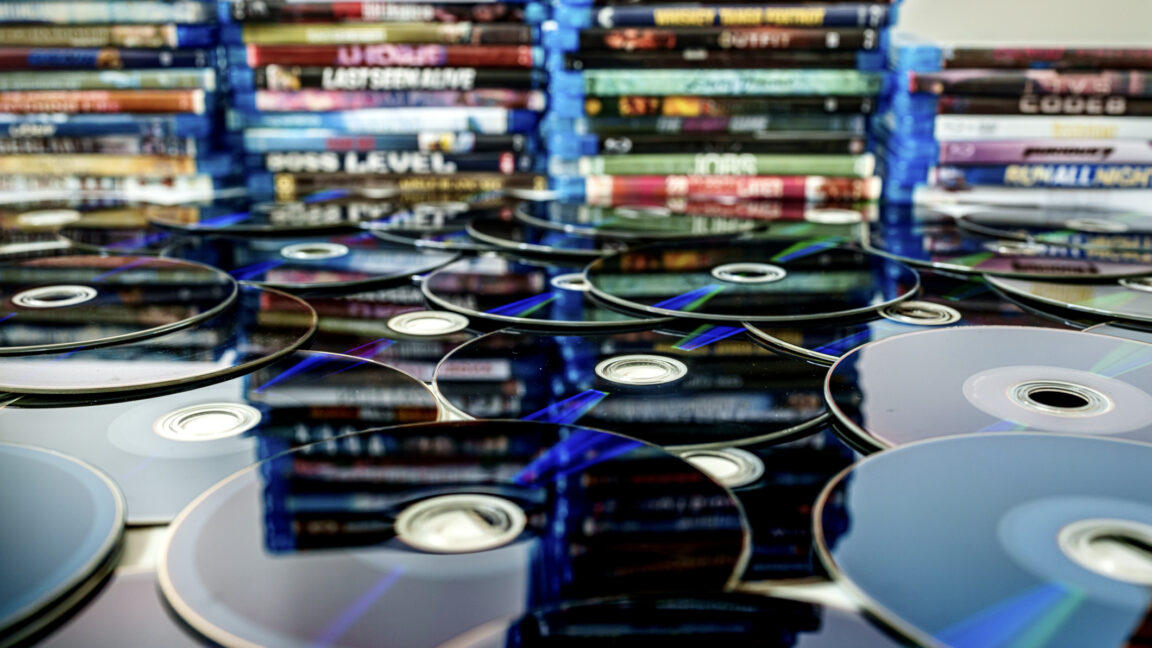Streaming uncertainty has some people clinging to their discs.
Like with much of physical media, the onslaught against optical media is ongoing. In the latest hit against physical media fans, LG has discontinued its remaining Blu-ray players. However, this doesn't spell the end for Blu-rays, which, in at least some categories, are seeing growing interest.
LG has no plans to make more Blu-ray players, FlatpanelsHD reported on Wednesday. Its most recent players, the UBK90 and UBK80, came out in 2018 and are no longer available for purchase on LG’s website. You can still find them at third-party retailers, but when stock runs out, LG won’t be replenishing. Trying to access LG's "Blu-ray & DVD Players" webpage now results in a redirect to LG's 4K TVs. We can take a hint, LG.
FlatpanelsHD spoke with LG Korea, which reportedly didn’t commit to a permanent exit from Blu-ray players. But for the foreseeable future, the company won’t be selling a type of device that it hasn’t updated in almost seven years.
Other tech companies have also shown reduced interest in the Blu-ray business. Panasonic, Sony, and Oppo also haven’t released a Blu-ray player since 2018. And Samsung stopped making new Blu-ray players in 2019. Video game consoles don’t even automatically include disc readers like they used too. The features are optional for PlayStation 5 and Xbox Series X consoles. And Sony said this year that it's ending the development and production of recordable Blu-rays for consumers.
This makes sense, considering that Blu-ray sales peaked in 2017 at 884,000 units sold, according to US sales data from the Consumer Technology Association shared in 2020.
Even worse for the Blu-ray player market is the fact that Blu-rays have become harder to find as users increasingly rely on the instant gratification and massive libraries available online. Best Buy stopped selling Blu-rays and DVDs this year. Blu-ray and DVD rental kiosk business Redbox went out of business this year, and many of the discs that its defunct kiosks had remaining have been donated. Disney also stopped releasing Blu-rays and DVDs in certain geographies last year.
And to expand to other optical discs, Target announced this year that it would only sell DVDs during special times, like holiday seasons or upon new releases. Target still appears to sell Blu-rays online and in stores, though.
But just because a consumer tech is no longer mainstream, and more immediately accessible and convenient alternatives are available, doesn’t mean that the older tech is totally forgotten (just look at the apparent resurgence of older digital cameras and even VHS tapes).
People are holding onto their physical media
Lack of control, uncertainty, and frustration associated with online media has long persuaded some TV fans and movie buffs to retain physical media. Streaming services tend to hike prices, even after suggesting that they won’t. They also pull content from their platforms regularly and are even known to delete on-demand purchases, (which, per licensing agreements, are really just indefinite loaners).
The infiltration of ads into streaming services and changing rules and features of streaming subscriptions have also led people to yearn for a simpler time. And the necessity for strong Internet connections and demands for 4K and/or HDR can also push people to opt for physical media, which should work the same way every time.
Speaking of things staying the same, Blu-rays and DVDs also won’t have their content altered after purchase, as we’ve seen happen to digital versions of media.
While certainly in decline, the US Blu-ray and DVD disc market made $1.34 billion in the year ending in March 2023, according to market research group Circana. Data from the first half of 2024 from entertainment trade association The Digital Entertainment Group (DEG) found that while overall Blu-ray and DVD sales declined 22.2 percent during that time period, there were some areas of growth, too:
Consumers continue to show strong demand for collectible disc formats with SteelBooks, [or Blu-rays sold in collectible steel cases], up 44 percent and 4K UHD Blu-ray catalog sales growing by 16 percent.

Furthermore, sales of newly released Blu-rays decreased more slowly, at 14 percent, according to DEG. A look at the top-selling Blu-rays for the week ending on November 30 based on data from Circana shows recent films, like Beetlejuice Beetlejuice and Deadpool & Wolverine, topping the list.
And it was only about a year ago that 4K Blu-rays of the megahit Oppenheimer actually sold out.
There are still options
For those interested in a new Blu-ray player, though, the options are more limited with LG exiting the market, but that doesn’t mean you’re out of luck. Even though brands like Panasonic and Sony haven’t made new Blu-ray players in years, they continue to sell them. And the market still sees the occasional new release, such as the Magnetar UPD900 that came out last year.
With the benefits of physical media still present, the demise of LG Blu-ray players is notable, but not defining, for physical media aficionados.
For those who don’t want to use their Blu-ray player anymore, there’s always the option to turn it into a laser-scanning microscope.
Hope you enjoyed this news post.
Thank you for appreciating my time and effort posting news every day for many years.
2023: Over 5,800 news posts | 2024 (till end of November): 5,298 news posts
RIP Matrix | Farewell my friend ![]()
- flash48 and dabourzannan
-

 2
2



3175x175(CURRENT).thumb.jpg.b05acc060982b36f5891ba728e6d953c.jpg)
Recommended Comments
There are no comments to display.
Join the conversation
You can post now and register later. If you have an account, sign in now to post with your account.
Note: Your post will require moderator approval before it will be visible.